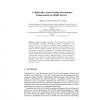Free Online Productivity Tools
i2Speak
i2Symbol
i2OCR
iTex2Img
iWeb2Print
iWeb2Shot
i2Type
iPdf2Split
iPdf2Merge
i2Bopomofo
i2Arabic
i2Style
i2Image
i2PDF
iLatex2Rtf
Sci2ools
118
click to vote
ESAW
2005
Springer
2005
Springer
Collaborative Agent Tuning: Performance Enhancement on Mobile Devices
Ambient intelligence envisages a world saturated with sensors and other embedded computing technologies, operating transparently, and accessible to all in a seamless and intuitive manner. Intelligent agents of varying capabilities may well form the essential constituent entities around which this vision is realized. However, the practical realization of this vision will severely exacerbate the complexity of existing software solutions, a problem that autonomic computing was originally conceived to address. Thus we can conjecture that the incorporation of autonomic principles into the design of Multi-Agent Systems is indeed a desirable objective. As an illustration of how this may be achieved, a strategy termed Collaborative Agent Tuning is described, which seeks to optimise agent performance on computationally limited devices. A classic mobile computing application is used to illustrate the principles involved.
Autonomic Computing | Embedded Computing Technologies | ESAW 2005 | Essential Constituent Entities |
Related Content
| Added | 27 Jun 2010 |
| Updated | 27 Jun 2010 |
| Type | Conference |
| Year | 2005 |
| Where | ESAW |
| Authors | Conor Muldoon, Gregory M. P. O'Hare, Michael J. O'Grady |
Comments (0)

